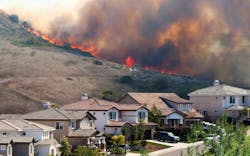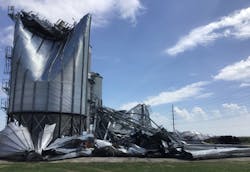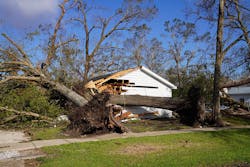Latest from Business Management
The State of E-Biz in the Electrical Market
Sponsored
While the country is still reeling from the pandemic, several regions across the nation are also experiencing a range of natural disasters. On August 10, a windstorm —properly known as a derecho — whipped across Iowa with little notice. Hurricane Laura hit the Gulf Coast at the end of August, followed in September by Hurricane Sally, which devastated the Alabama coast and Florida panhandle. Meanwhile, at press time, wildfires continue raging across some areas of California, Oregon and Washington.
While some natural disasters, like wildfires or hurricanes, can be expected each year, the damage they create still leaves a plethora of challenges for homeowners, utilities and businesses. Those in the electrical industry can play a significant role, bringing relief to those left without power or facing other related electrical damage. As these natural disasters continue to play out, the editors of Electrical Wholesaling spoke with several distributors and rep agencies in regions hit the hardest to compile 10 best practices for facing natural disasters head on.
#1. Absorb the shock. Bill Devereaux, president of Marion, IA-based R/B Sales Corp., says early in his career he learned how important it is to recognize the shock value of a natural disaster before even thinking of what products you need or services you must prioritize for your customers. “The first thing is always to get the initial shock out of your own system so you can deal with the needs at hand,” he says. “Don’t deny the shock — absorb it and use that energy to move forward.”
#2. Assess the damage. No natural disaster is routine, so it’s vital to analyze each individual situation. For example, immediately after the derecho in Iowa, Devereaux says 97% of homes and buildings lost electricity; trees caused severe damage to utility lines, yards and homes; cell service towers were downed; and more, meaning a great need for the electrical industry to step in. Kelly Boyd, president of ElectroRep, Inc., which services the California and northern Nevada markets, says wildfires cause poor air quality and visibility, thus shutting down many construction sites and causing more economic disruption. But they also create the need for temporary power, supporting shelters, medical triage and temporary housing.
#3. Have an emergency-disaster plan. If you don’t have one already in place, now is the time to make one. About two years ago, ElectroRep lost power for three days at its main offices, which Boyd says sparked the need for a better emergency back-up plan. When wildfires (and the pandemic) hit this year, he says ElectroRep was much more prepared to have employees work virtually and get supplies to customers in need of electrical supplies.
Additionally, Boyd notes that the wildfires have reinforced that the work-from-home model may be here to stay, so he recommends investing in a solid cloud-based and mobile work platform. “An office might be overrated in times of natural disaster,” he says.
#4. Check in on your employees. No one is immune during a natural disaster — and that includes your employees. Employees at electrical distributors or rep agencies are vital players during times like these, so keeping up company morale and making sure your employees feel safe and cared for is of upmost importance.
Lura McBride, president and CEO of Cedar Rapids, IA-based distributor Van Meter Inc. (#25 on EW’s 2020 Top 200), said that one thing differentiating this disaster from the last major one she experienced (a flood back in 2008) is that over 200 of Van Meter’s (VW) employee-owners were directly impacted by the derecho, from losing internet or cell service to being trapped in their neighborhoods due to damage. McBride says a team of VM employee-owners spent days and nights going to the homes of their people to dig out and clean up.
#5. Get your own facilities up and running. Many mentioned that this year’s recent disasters caused at least some damage to their own facilities, so it’s important to assess your own building’s damage and what needs to be done to at least temporarily restore operations. According to Rose McDaniel, director, national operations for Graybar (#3 on EW’s 2020 Top 200), as of Sept. 16, power was still out in the Lake Charles, LA, branch from August 30. Similarly, R/B Sales’ facilities was running on a small inverter generator for nearly a week, says Devereaux, in order to establish communications, albeit at a compromised level. In addition to moving immediately to generator power so they could keep working, McBride says VM also saw roof and wall damage, doors blown off hinges, uprooted and snapped trees, a flattened flagpole and more.
#6. Stock up. Johnny Winfree, area manager for 17 of Elliott Electric Supply’s (#13 on EW’s 2020 Top 200) branches across Louisiana and southern Arkansas, is no stranger to hurricanes. At the beginning of each hurricane season in June, they anticipate at least one storm each year and ensure minimum inventory levels are maintained on storm-related items. “If you wait until a storm is named and closing in, you may be too late,” Winfree says, adding that you may need to think two, three or even four days out, order multiple shipments of the same product or order from multiple manufacturers.
#7 Move quickly. Additionally, Winfree says not to underestimate the importance of speed, especially during emergencies. “The ability to move quickly during a storm cannot be overstated,” Winfree adds. “If one truck gets held up on its way to you, it can hold up the entire process and leave our customers without the ability to complete a job.”
#8. Focus on the here-and-now. While each individual natural disaster may require different product needs from customers, all sources agreed on the importance of short-term power solutions for their customers to be able to get back to base operations. Some of the most in-demand products include portable generators, temporary lighting, wire and cable, extension cords, service entrance heads, conduit, portable cords, Twist-Lock plugs, reducers, meter sockets and transformers, among others. Devereaux also adds that natural disasters require “lots of ingenuity.”
#9. Turn to the community. Don’t be afraid to collaborate with your community so you are in turn prepared to help. For Graybar’s Lake Charles, LA, branch, they worked with a customer to secure fuel for vehicles and generators, says Rose McDaniel. Additionally, ElectroRep’s Boyd says it was a great experience working with local leaders to collaborate in areas like HR law and 24/7 communication, while witnessing everyone rallying together.
#10. Don’t forget your electrical industry relationships. It’s also key to recognize the importance of industry-wide teamwork. “Our industry really is all about relationships,” Lura McBride says. She shares that suppliers offered to drive materials from their factories hundreds of miles away to help, while one individual even came to town with his chainsaw to assist with clean-up efforts for VM employee-owners.
Others we spoke with shared similar sentiments. “As much as we have learned about what products are needed for an emergency, what plays out every time is effective communication, utilizing your relationships and trusting one another,” Devereaux said. “Once people start moving in the same direction toward recovery, wonderful things can happen.”





